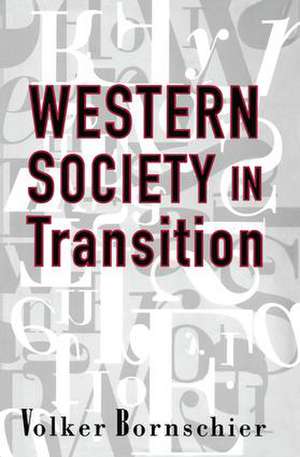Western Society in Transition
Autor Volker Bornschieren Limba Engleză Hardback – 30 ian 1996
| Toate formatele și edițiile | Preț | Express |
|---|---|---|
| Paperback (1) | 278.13 lei 43-57 zile | |
| Taylor & Francis – 16 apr 2018 | 278.13 lei 43-57 zile | |
| Hardback (1) | 682.21 lei 43-57 zile | |
| Taylor & Francis – 30 ian 1996 | 682.21 lei 43-57 zile |
Preț: 682.21 lei
Preț vechi: 802.60 lei
-15% Nou
Puncte Express: 1023
Preț estimativ în valută:
130.58€ • 141.89$ • 109.76£
130.58€ • 141.89$ • 109.76£
Carte tipărită la comandă
Livrare economică 21 aprilie-05 mai
Preluare comenzi: 021 569.72.76
Specificații
ISBN-13: 9781560002277
ISBN-10: 1560002271
Pagini: 464
Dimensiuni: 152 x 229 x 31 mm
Greutate: 0.79 kg
Ediția:1
Editura: Taylor & Francis
Colecția Routledge
Locul publicării:Oxford, United Kingdom
ISBN-10: 1560002271
Pagini: 464
Dimensiuni: 152 x 229 x 31 mm
Greutate: 0.79 kg
Ediția:1
Editura: Taylor & Francis
Colecția Routledge
Locul publicării:Oxford, United Kingdom
Cuprins
Introduction and Overview The Argument Spelled Out Principles of Social Structures and Their Institutional Manifestations The Regulative Impact of the World Market Waves and Cycles as Modes of Change Discontinuities and Their Links Technological Styles Politico-economic Regimes The Societal Model and its Career Shaping Institutional Orders The Artificial Person and Structures of Economic Power Schools and the Myth of Equal Opportunity The Torturous Paths of Capital and State Evolution Convergence in the West? Convergence and Persisting Differences Japan: Any Lessons for the West? Legitimacy and Comparative Advantage Present Transformations and Future Competitive Edges Cornerstones of a New Societal Model Hegemonic Conditions without a Hegemon
Notă biografică
Volker Bernschier is Professor in the Institute for Sociology at the University of Zurich, Switzerland.
Descriere
An enormous acceleration of history has occurred in the current decade, thereby radically changing world society in many respects
